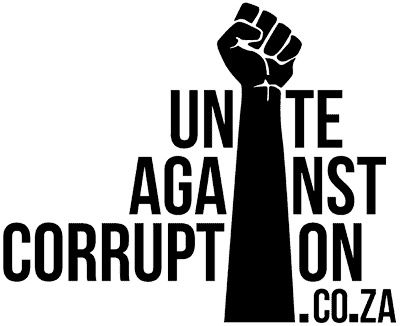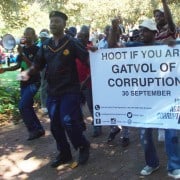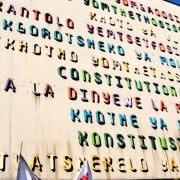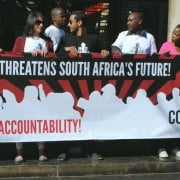|
Getting your Trinity Audio player ready...
|
UNITE AGAINST CORRUPTION DEMANDS 
We, citizens and residents of South Africa, have gathered here in our thousands today under the banner of Unite Against Corruption to tell the government that we have had enough of corruption, which is crippling our economy, destroying jobs, stealing from the poor, sabotaging service delivery and undermining the basis of our democracy.
We have had enough, and so we insist that government and big business prioritise combating corruption and acts speedily to bring those guilty to justice and we make the following specific demands:
In order to combat corruption in those sectors that produce basic goods and deliver basic services:
- We must get rid of corruption in healthcare, education, public transport, water, social welfare and basic nutrition for children, to stop the diversion of funds budgeted for these services into the pockets of tenderpreneurs;
- End corruption in the allocation of adequate housing; no-‐one should be living in shacks because money for housing for the poor is being misappropriated;
- Our physical security and that of our property must be protected by rooting out corruption in the police, justice and immigration services;
- Action must be taken to end corruption by companies, including those who bake our bread, guard our savings, supply our medicines, who collude to fix prices, exploit monopoly domination in sectors and are motivated not by our basic needs but rather by their obscene greed and the corruption that satisfies it;
- Our pension money must be safe from being stolen by corrupt administrators and then invested in their cronies’ crooked businesses.
In order to achieve accountable and transparent leadership:
- Party political funding must be made transparent and public
- Lifestyle audits of senior public servants should be conducted annually by the Auditor-General or the Public Service Commission to expose those who live fraudulently beyond their means.
- While on duty all public servants should wear name tags so that they are easily identifiable to the public
- Special courts must be established to adjudicate disputes in relation to requests for information in terms of the Promotion of Access to Information Act
In order to achieve effective enforcement and implementation of anti-corruption laws:
- Strengthen anti-corruption laws such as the Prevention and Combating of Corrupt Activities Act; the Prevention of Organised Crime Act; the Protected Disclosures Act (also known as the Whistleblower’s Act); and the Criminal Procedure Act, among others
- A collective body on which civil society is represented must appoint – after public interviews – the commissioner and deputy commissioners of police, and the national director of public prosecutions and deputies.
- Nobody with a criminal record must be employed in the police or prosecutorial services and Individuals dismissed for corrupt or unethical conduct must be blacklisted from employment in the public sector
In order to protect our whistleblowers:
- The Public Disclosures Act should be amended so as to include disclosures by citizens whistleblowers
- A central body should be established to manage protected disclosures across all spheres of government
In order to guaranteed greater respect for those charged with combating corruption:
- Strengthen domestic anti-corruption institutions – the Public Protector, Directorate for Priority Crime Investigation (the Hawks); the Special Investigating Unit; the Financial Intelligence Centre; the National Prosecuting Authority and its specialised units, including the Commercial Crime Unit; the Asset Forfeiture Unit and the Witness Protection Unit.
- Implement the findings of the Public Protector
- Increase the budget of the Public Protector
- Public contempt for and vilification of the Public Protector should be subject to criminal prosecution
- Strengthen the Offices of the Public Protector and the Auditor-General and reject any merger of the Office of the Public Protector and the South African Human Rights Commission
In order to achieve greater accountability from business:
- South Africa should become a signatory to the Extractive Industries Transparency Initiative
- All firms above a specified size threshold must institute anti-corruption compliance programmes
- Businesses that are found guilty of corruption and collusion must be placed on a blacklist/register that is publicly available
In order to ensure transparent regulation of public procurement:
- Any company bidding for a public sector contract must be required to reveal its true owners, and such information must be published in a publicly available register
- Citizens must be represented on bid adjudication committees to monitor public tenders that exceed a specified rand-value threshold
- Public servants and elected representatives must be prohibited from doing business with the state
- The Treasury must establish a panel of firms specialising in forensic investigation to which all corruption or tender complaints will be submitted; where applicable, the Treasury must rotate cases among forensic firms, taking account of potential conflicts of interest.
- Corruption and tender fraud must be fast-tracked through the commercial courts and convictions with jail terms secured.
- Individuals dismissed for corrupt or unethical conduct in the private sector must be blacklisted from employment in the public sector
- Those who are alleged to be engaged in corrupt conduct should be charged; resignation should never be allowed to substitute for disciplinary proceedings and criminal prosecution.
- Government must release to the public all forensic audits conducted in terms of section 6(2)(e) of the Public Finance Management Act and section 5(2)(d) of the Municipal Finance Management Act, particularly the 2009 Sicelo Shiceka audit of potential irregularities and maladministration in municipalities in the North West.
In order to prevent corruption leading to job losses:
- National Treasury must compile a report on all organs of state and state-owned enterprises that do not comply with laws to ensure that such entities procure local goods and services and it must outline steps to ensure compliance.
- The South African Revenue Service, the South African Reserve Bank and Finance Intelligence Centre must investigate the problem of illicit financial flows, transfer pricing and money laundering, and take strong steps to deal with these crimes.
- A multi-disciplinary team made up of National Prosecuting Authority, Priority Crimes Litigations Unit, South African Police Services, Directorate for Priority Crime Investigation, Office of the Public Protector and Auditor-General must investigate economic crimes committed under late apartheid (1980 – 1994), in particular in relation to sanctions busting.








